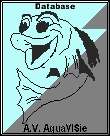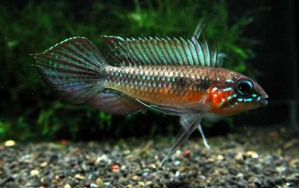 |
Apistogramma elizabethae |
 |
||||||||||||||||||||
|
|
|
|
||||||||||||||||||||
| Explanation of the symbols | ||||||||||||||||||||||
|
|
|
|||||||||||||||||||||
 |
|
|||||||||||||||||||||
|
This dwarfcichlid can be kept in a community aquarium
together with other small peaceful fishes because they get
shy with fishes that are too big, but you can better keep
them in an aquarium that is set up especially for dwarfcichlids. A male forms a harem and as a result, should
be kept in a ration of one male to every three or four
females. Males defend a large territory in which several
females may guard their own brood. In bigger tanks (150 cm -
60" or more) you can keep more males (2-4) and 6-10
females. The aquarium should be set up with stones,
driftwood and roots, and on the sides and background densely
planted, because they need hiding places.
You should feed them with small live food like Artemia and small waterfleas. Breeding is not easy. You need a good matching couple and very soft and acid water. Up to 200 eggs are laid and fertilized in a cave. The first 10 days the female takes care of the fry and the male defends the territory. When the young fishes are swimming free both parents take care of them. You can feed the young with baby brine shrimp. |
||||||||||||||||||||||
|
|
||||||||||||||||||||||
|
Yoritaka Honda |
||||||||||||||||||||||
 |
||||||||||||||||||||||
|
Copyright ©AV AquaVISie. All rights reserved. |
||||||||||||||||||||||